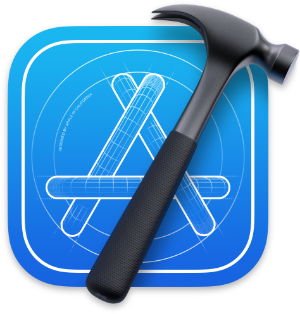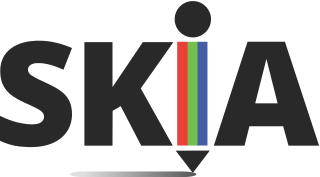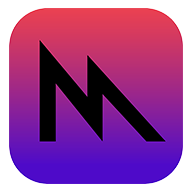
OpenGL is a cross-language, cross-platform application programming interface (API) for rendering 2D and 3D vector graphics. The API is typically used to interact with a graphics processing unit (GPU), to achieve hardware-accelerated rendering.

Wine is a free and open-source compatibility layer to allow application software and computer games developed for Microsoft Windows to run on Unix-like operating systems. Developers can compile Windows applications against WineLib to help port them to Unix-like systems. Wine is predominantly written using black-box testing reverse-engineering, to avoid copyright issues. No code emulation or virtualization occurs. Wine is primarily developed for Linux and macOS.

Xcode is Apple's integrated development environment (IDE) for macOS, used to develop software for macOS, iOS, iPadOS, watchOS, tvOS, and visionOS. It was initially released in late 2003; the latest stable release is version 15, released on September 18, 2023, and is available free of charge via the Mac App Store and the Apple Developer website. Registered developers can also download preview releases and prior versions of the suite through the Apple Developer website. Xcode includes command-line tools which enable UNIX-style development via the Terminal app in macOS. They can also be downloaded and installed without the GUI.
OpenVG is an API designed for hardware-accelerated 2D vector graphics. Its primary platforms are mobile phones, gaming & media consoles and consumer electronic devices. It was designed to help manufacturers create more attractive user interfaces by offloading computationally intensive graphics processing from the CPU onto a GPU to save energy. The OpenGL ES library provides similar functionality for 3D graphics. OpenVG is managed by the non-profit technology consortium Khronos Group.

OpenGL for Embedded Systems is a subset of the OpenGL computer graphics rendering application programming interface (API) for rendering 2D and 3D computer graphics such as those used by video games, typically hardware-accelerated using a graphics processing unit (GPU). It is designed for embedded systems like smartphones, tablet computers, video game consoles and PDAs. OpenGL ES is the "most widely deployed 3D graphics API in history".
Mesa, also called Mesa3D and The Mesa 3D Graphics Library, is an open source implementation of OpenGL, Vulkan, and other graphics API specifications. Mesa translates these specifications to vendor-specific graphics hardware drivers.

OpenCL is a framework for writing programs that execute across heterogeneous platforms consisting of central processing units (CPUs), graphics processing units (GPUs), digital signal processors (DSPs), field-programmable gate arrays (FPGAs) and other processors or hardware accelerators. OpenCL specifies programming languages for programming these devices and application programming interfaces (APIs) to control the platform and execute programs on the compute devices. OpenCL provides a standard interface for parallel computing using task- and data-based parallelism.
Video Decode and Presentation API for Unix (VDPAU) is a royalty-free application programming interface (API) as well as its implementation as free and open-source library distributed under the MIT License. VDPAU is also supported by Nvidia.

The Skia Graphics Engine or Skia is an open-source 2D graphics library written in C++. Skia abstracts away platform-specific graphics API. Skia Inc. originally developed the library; Google acquired it in 2005, and then released the software as open source licensed under the New BSD free software license in 2008.

PPSSPP is a free and open-source PSP emulator for Windows, macOS, Linux, iOS, Android, Nintendo WiiU, Nintendo Switch, BlackBerry 10, MeeGo, Pandora, Xbox Series X/S and Symbian with an increased focus on speed and portability. It was first released to the public on November 1, 2012, licensed under the GNU GPLv2 or later. The PPSSPP project was created by Henrik Rydgård, one of the co-founders of the Dolphin emulator.
Blink is a browser engine developed as part of the Chromium project with contributions from Apple, Google, Meta, Microsoft, Opera Software, Vivaldi Technologies, Adobe, Intel, IBM, Samsung, and others. It was first announced in April 2013.

mpv is free and open-source media player software based on MPlayer, mplayer2 and FFmpeg. It runs on several operating systems, including Unix-like operating systems and Microsoft Windows, along with having an Android port called mpv-android. It is cross-platform, running on ARM, PowerPC, x86/IA-32, x86-64, and MIPS architecture.

Godot is a cross-platform, free and open-source game engine released under the permissive MIT license. It was initially developed by Argentine software developers Juan Linietsky and Ariel Manzur for several companies in Latin America prior to its public release in 2014. The development environment runs on many platforms, and can export to several more. It is designed to create both 2D and 3D games targeting PC, mobile, and web platforms and can also be used to develop non-game software, including editors.

TrueAudio is the name given to AMD's ASIC intended to serve as dedicated co-processor for the calculations of computationally expensive advanced audio signal processing, such as convolution reverberation effects and 3D audio effects. TrueAudio is integrated into some of the AMD GPUs and APUs available since 2013.

Metal is a low-level, low-overhead hardware-accelerated 3D graphic and compute shader API created by Apple, debuting in iOS 8. Metal combines functions similar to OpenGL and OpenCL in one API. It is intended to improve performance by offering low-level access to the GPU hardware for apps on iOS, iPadOS, macOS, and tvOS. It can be compared to low-level APIs on other platforms such as Vulkan and DirectX 12.
Vulkan is a low-level low-overhead, cross-platform API and open standard for 3D graphics and computing. It was originally developed as Mantle by AMD, but was later given to Khronos Group. It was intended to address the shortcomings of OpenGL, and allow developers more control over the GPU. It is designed to support a wide variety of GPUs, CPUs and operating systems, it is also designed to work with modern multi-core CPUs.

Standard Portable Intermediate Representation (SPIR) is an intermediate language for parallel computing and graphics by Khronos Group. It is used in multiple execution environments, including the Vulkan graphics API and the OpenCL compute API, to represent a shader or kernel. It is also used as an interchange language for cross compilation.

LunarG is a software company specializing in device driver development for video cards.
WebGPU is the working name for a potential web standard and JavaScript API for accelerated graphics and compute, aiming to provide "modern 3D graphics and computation capabilities". It is developed by the W3C GPU for the Web Community Group with engineers from Apple, Mozilla, Microsoft, Google, and others.

macOS Mojave is the fifteenth major release of macOS, Apple Inc.'s desktop operating system for Macintosh computers. Mojave was announced at Apple's Worldwide Developers Conference on June 4, 2018, and was released to the public on September 24, 2018. The operating system's name refers to the Mojave Desert, and is part of a series of California-themed names that began with OS X Mavericks. It succeeded macOS High Sierra and was followed by macOS Catalina. macOS Mojave is the last version of macOS that features the iTunes and Dashboard apps.













